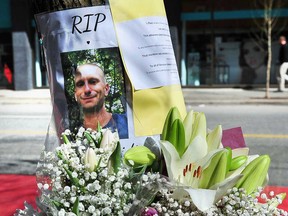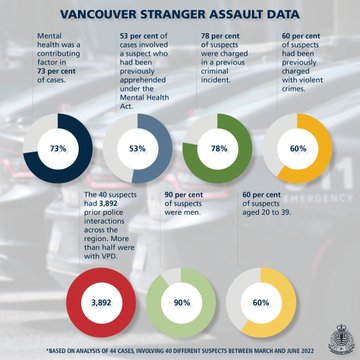Canada, a Consequence-Free Jurisdiction for Public Violence
"He was brought before a judge and released with conditions and the charges were later stayed."
Edmonton Police Chief Dale McFee
"[There is] over-incarceration of Indigenous and other marginalized people in custody [relatable to increased criminality with its roots in societal traumas brought by the Indian Residential School system]."
"It's sad to see, but we still have a responsibility to ensure the public safety of our communities, because 99 percent of the time the offender is Indigenous and so is the victim."
Daren Montour, Chief of the Six Nations Police Service
 |
Edmonton Police are loathe to release the name of the man dubbed a 'suspect' -- a man who acted as yet another perpetrator of 'stranger attacks' occurring all over Canada -- who stabbed to death in broad daylight outside a school, an Edmonton mother and her 11-year-old child. Their assailant was a complete stranger. What the Edmonton Police did release is that he had a long history of random violent encounters , including some against children, and had only recently been released from prison.
The spike in random violence is being attributed to a systemic failure of Canadian bail policy, where chronic violent offenders are released from custody, readily and too frequently, according to a near-unanimous coalition of police and political leaders. The situation is seen as the unintended consequence of a program set up to address the country's 'over-reliance' on incarceration as well as the 'over-representation' of marginalized groups within the prison system.
Canada, as it happens, had one of the lowest incarceration rates in the democratic world. Under the Liberal government of Prime Minister Justin Trudeau, this low rate of incarceration has dropped even lower, reflecting progressive compassion for the perceived underdog, over government responsibility to ensure that cities and towns and their inhabitants anywhere and everywhere in Canada are safe and secure from violence.
In 2015, when the Trudeau Government took office, statistics indicated 87.9 people jailed for evry100,000 Canadians. The last count in 2022 showed 66.8 for every 100,000, representing a 24 percent reduction. The non-profit World Prison Brief in 2016 identified Canada with a lower overall incarceration rate than Luxembourg, Spain and the U.K.; tied roughly with Belgium and France.
Now at the lower end of incarceration rates among G20 nations, in 2021 prison investigators issued a report in Australia concluding that Canada's incarceration rate was over 50 percent lower than its own. In comparing Canada to the rest of its hemispheric coevals, the disparity becomes particularly pronounced. Major South and Central American countries have an incarceration rate orders of magnitude higher than Canada's.
Canada ranked 164th in the world for incarceration rate, according to the tally maintained by World Prison Brief, with 2020 data. A ranking that has Canada with an incarceration rate of 85 per 100,000, in comparison to 531 for the United States, and 174 for Mexico. The only countries with lower prison populations are either European with exceptionally low rates of crime, or African countries lacking resources to maintain comprehensive criminal justice systems.
The-then Justice Minister in 2015 was tasked to explore "sentencing alternatives" and "bail reform" as well as "initiatives to reduce the rate of incarceration amongst Indigenous Canadians". A project no doubt dear to the heart of the-then minister, herself an Indigenous Canadian of high repute and accomplishment. In less than a few months the Justice Ministry released consultation reports focusing on Canada's "Over-reliance on incarceration".
Bill C-75 included a "modernization" of the bail system, requiring judges to consider a suspect's ethnic background when reaching judgement whether to release them from remand. Bail hearings previously had for the most part focused on flight risk and public safety. Following that, the Department of Justice produced Bill C-5, proposing to drop mandatory minimum sentences for a wide variety of firearms offences, openly declaring the justice system to be shot through with "systemic racism".
 |
Bill C-75 is held by its critics to have yielded the consequence of increasing urban disorder and criminality by removing the option of police enforcing release conditions. Minister of Justice Murray Rankin in British Columbia's government, one led by the New Democratic Party, pointed out that the law had initiated a sharp rise of violent, repeat offenders attacking strangers on the streets of British Columbia.
Canada, it seems, has released so many non-Indigenous prisoners they have failed to address core justifications in pursuing the Trudeau government's prison reform in the first place: Indigenous "over-representation".
Canada's most recent statistics, according to the Correction Service of Canada, of "custodial admissions identify as Indigenous, a slightly higher share than in 2015, when the Justice Department first began studying the problem of "over-representation of Indigenous people".
Labels: 'Stranger Attacks', Bail, Justice System, Mandatory Minimum Sentencing, Prime Minister Justin Trudeau, Public Violence
0 Comments:
Post a Comment
<< Home